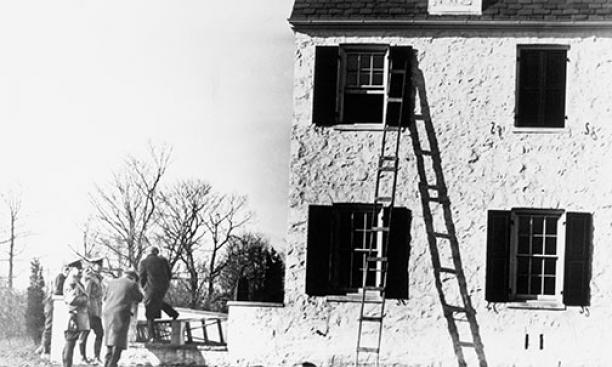

“The Crime of the Century” took place just eight miles from campus, when someone snatched the Lindbergh baby from his crib on the cold, windy evening of March 1, 1932. Princeton students marched through the woods of Hopewell, looking for clues.
It had been five years since Charles Lindbergh’s sensational flight across the Atlantic. Stunned by the sudden fame, he had hired lawyer Henry Breckinridge 1907 as his personal adviser. Breckinridge introduced him to University president John Grier Hibben 1882, who offered the aviator-scientist access to campus laboratories where he could undertake biomedical research — he collaborated with a French surgeon on a glass heart pump.
Lindbergh married into a wealthy New Jersey family and built an estate near Hopewell, 19 minutes away by car from Princeton. When he found the toddler missing, Lindbergh instantly called Breckinridge, who raced down from New York and after midnight knocked frantically on the dorm-room door of his stepson, Oren Root ’33: Could he remember the twisting route to Hopewell?
The Lindbergh estate was a blaze of lights when they arrived, and swarming with police. Hibben soon came as well. The first reporter on hand — the start of a media frenzy — was PAW contributing editor Edmund DeLong ’22.
During the sleepless weeks that followed, Breckinridge negotiated with shady types who claimed to be the kidnapper. Hibben offered to do the same. Ransom was paid, but the baby was not returned.
In May, a truck driver stumbled upon a tiny corpse just off the Princeton-Hopewell Road. Apparently the child had been killed during the abduction.
Ransom money was discovered later at a home in the Bronx, pointing to the involvement of Bruno Richard Hauptmann, a German with a criminal record. Found guilty of the baby’s death, he insisted he was innocent until the end and died in the electric chair in Trenton in 1936. Fifty years after the baby’s body was found, Harry Heher Jr. ’49, son of a state Supreme Court justice who had heard Hauptmann’s unsuccessful appeal, presented the 4,320-page trial transcript to Firestone Library.
